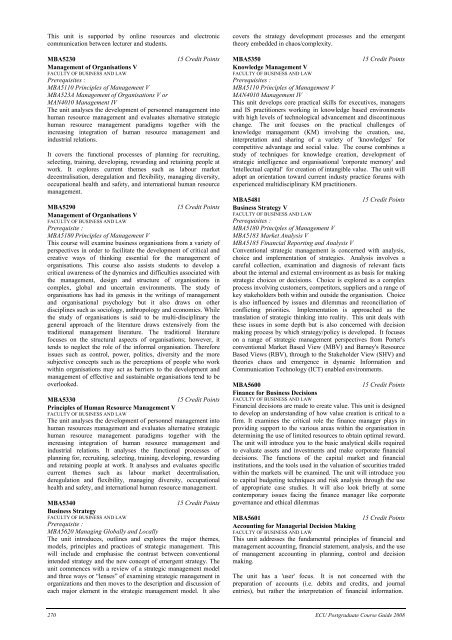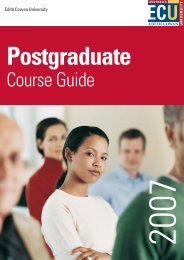Postgraduate - Edith Cowan University
Postgraduate - Edith Cowan University
Postgraduate - Edith Cowan University
You also want an ePaper? Increase the reach of your titles
YUMPU automatically turns print PDFs into web optimized ePapers that Google loves.
This unit is supported by online resources and electronic<br />
communication between lecturer and students.<br />
MBA5230 15 Credit Points<br />
Management of Organisations V<br />
FACULTY OF BUSINESS AND LAW<br />
Prerequisites :<br />
MBA5110 Principles of Management V<br />
MBA523A Management of Organisations V or<br />
MAN4010 Management IV<br />
The unit analyses the development of personnel management into<br />
human resource management and evaluates alternative strategic<br />
human resource management paradigms together with the<br />
increasing integration of human resource management and<br />
industrial relations.<br />
It covers the functional processes of planning for recruiting,<br />
selecting, training, developing, rewarding and retaining people at<br />
work. It explores current themes such as labour market<br />
decentralisation, deregulation and flexibility, managing diversity,<br />
occupational health and safety, and international human resource<br />
management.<br />
MBA5290 15 Credit Points<br />
Management of Organisations V<br />
FACULTY OF BUSINESS AND LAW<br />
Prerequisite :<br />
MBA5180 Principles of Management V<br />
This course will examine business organisations from a variety of<br />
perspectives in order to facilitate the development of critical and<br />
creative ways of thinking essential for the management of<br />
organisations. This course also assists students to develop a<br />
critical awareness of the dynamics and difficulties associated with<br />
the management, design and structure of organisations in<br />
complex, global and uncertain environments. The study of<br />
organisations has had its genesis in the writings of management<br />
and organisational psychology but it also draws on other<br />
disciplines such as sociology, anthropology and economics. While<br />
the study of organisations is said to be multi-disciplinary the<br />
general approach of the literature draws extensively from the<br />
traditional management literature. The traditional literature<br />
focuses on the structural aspects of organisations; however, it<br />
tends to neglect the role of the informal organisation. Therefore<br />
issues such as control, power, politics, diversity and the more<br />
subjective concepts such as the perceptions of people who work<br />
within organisations may act as barriers to the development and<br />
management of effective and sustainable organisations tend to be<br />
overlooked.<br />
MBA5330 15 Credit Points<br />
Principles of Human Resource Management V<br />
FACULTY OF BUSINESS AND LAW<br />
The unit analyses the development of personnel management into<br />
human resources management and evaluates alternative strategic<br />
human resource management paradigms together with the<br />
increasing integration of human resource management and<br />
industrial relations. It analyses the functional processes of<br />
planning for, recruiting, selecting, training, developing, rewarding<br />
and retaining people at work. It analyses and evaluates specific<br />
current themes such as labour market decentralisation,<br />
deregulation and flexibility, managing diversity, occupational<br />
health and safety, and international human resource management.<br />
MBA5340 15 Credit Points<br />
Business Strategy<br />
FACULTY OF BUSINESS AND LAW<br />
Prerequisite :<br />
MBA5620 Managing Globally and Locally<br />
The unit introduces, outlines and explores the major themes,<br />
models, principles and practices of strategic management. This<br />
will include and emphasise the contrast between conventional<br />
intended strategy and the new concept of emergent strategy. The<br />
unit commences with a review of a strategic management model<br />
and three ways or “lenses” of examining strategic management in<br />
organizations and then moves to the description and discussion of<br />
each major element in the strategic management model. It also<br />
covers the strategy development processes and the emergent<br />
theory embedded in chaos/complexity.<br />
MBA5350 15 Credit Points<br />
Knowledge Management V<br />
FACULTY OF BUSINESS AND LAW<br />
Prerequisites :<br />
MBA5110 Principles of Management V<br />
MAN4010 Management IV<br />
This unit develops core practical skills for executives, managers<br />
and IS practitioners working in knowledge based environments<br />
with high levels of technological advancement and discontinuous<br />
change. The unit focuses on the practical challenges of<br />
knowledge management (KM) involving the creation, use,<br />
interpretation and sharing of a variety of 'knowledges' for<br />
competitive advantage and social value. The course combines a<br />
study of techniques for knowledge creation, development of<br />
strategic intelligence and organisational 'corporate memory' and<br />
'intellectual capital' for creation of intangible value. The unit will<br />
adopt an orientation toward current industy practice forums with<br />
experienced multidisciplinary KM practitioners.<br />
MBA5481 15 Credit Points<br />
Business Strategy V<br />
FACULTY OF BUSINESS AND LAW<br />
Prerequisites :<br />
MBA5180 Principles of Management V<br />
MBA5183 Market Analysis V<br />
MBA5185 Financial Reporting and Analysis V<br />
Conventional strategic management is concerned with analysis,<br />
choice and implementation of strategies. Analysis involves a<br />
careful collection, examination and diagnosis of relevant facts<br />
about the internal and external environment as as basis for making<br />
strategic choices or decisions. Choice is explored as a complex<br />
process involving customers, competitors, suppliers and a range of<br />
key stakeholders both within and outside the organisation. Choice<br />
is also influenced by issues and dilemmas and reconciliation of<br />
conflicting priorities. Implementation is approached as the<br />
translation of strategic thinking into reality. This unit deals with<br />
these issues in some depth but is also concerned with decision<br />
making process by which strategy/policy is developed. It focuses<br />
on a range of strategic management perspectives from Porter's<br />
conventional Market Based View (MBV) and Barney's Resource<br />
Based Views (RBV), through to the Stakeholder View (SHV) and<br />
theories chaos and emergence in dynamic Information and<br />
Communication Technology (ICT) enabled environments.<br />
MBA5600 15 Credit Points<br />
Finance for Business Decisions<br />
FACULTY OF BUSINESS AND LAW<br />
Financial decisions are made to create value. This unit is designed<br />
to develop an understanding of how value creation is critical to a<br />
firm. It examines the critical role the finance manager plays in<br />
providing support to the various areas within the organisation in<br />
determining the use of limited resources to obtain optimal reward.<br />
The unit will introduce you to the basic analytical skills required<br />
to evaluate assets and investments and make corporate financial<br />
decisions. The functions of the capital market and financial<br />
institutions, and the tools used in the valuation of securities traded<br />
within the markets will be examined. The unit will introduce you<br />
to capital budgeting techniques and risk analysis through the use<br />
of appropriate case studies. It will also look briefly at some<br />
contemporary issues facing the finance manager like corporate<br />
governance and ethical dilemmas<br />
MBA5601 15 Credit Points<br />
Accounting for Managerial Decision Making<br />
FACULTY OF BUSINESS AND LAW<br />
This unit addresses the fundamental principles of financial and<br />
management accounting, financial statement, analysis, and the use<br />
of management accounting in planning, control and decision<br />
making.<br />
The unit has a 'user' focus. It is not concerned with the<br />
preparation of accounts (i.e. debits and credits, and journal<br />
entries), but rather the interpretation of financial information.<br />
270 ECU <strong>Postgraduate</strong> Course Guide 2008



